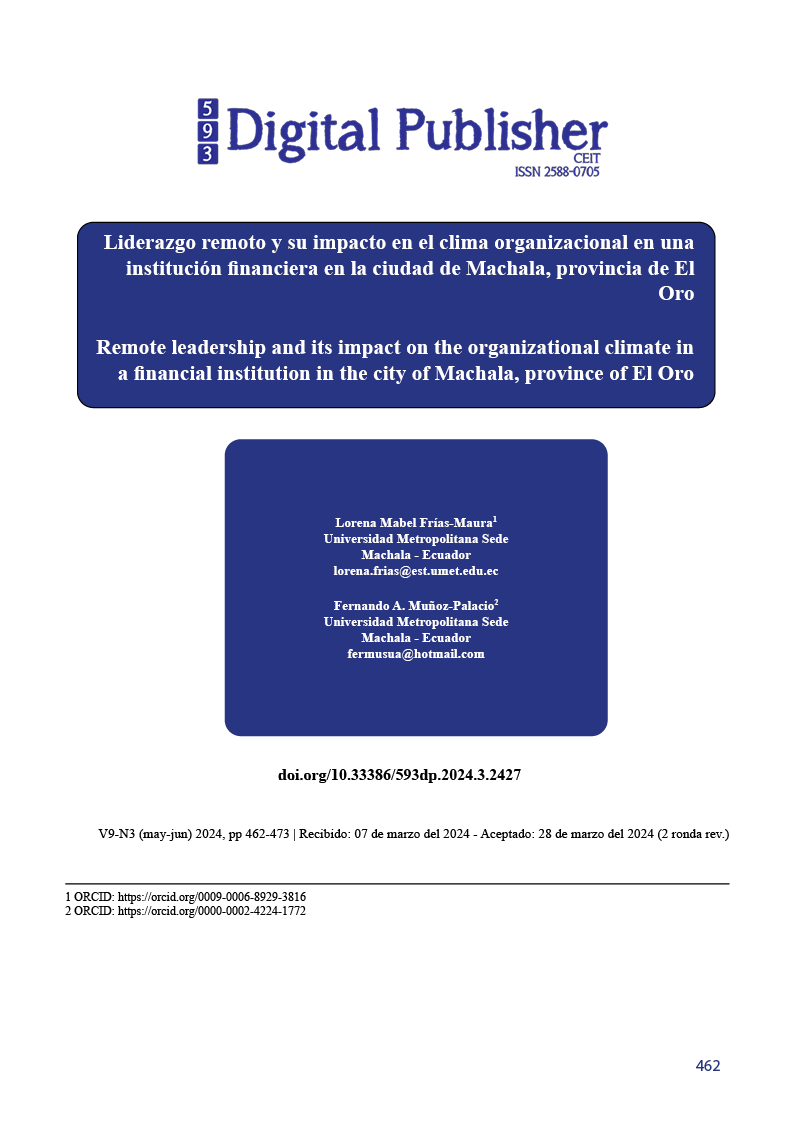Liderazgo remoto y su impacto en el clima organizacional en una institución financiera en la ciudad de Machala, provincia de El Oro
Contenido principal del artículo
Resumen
El estudio realizado sobre el impacto del liderazgo remoto en el clima organizacional en una Institución Financiera en la ciudad de Machala, se basó en un enfoque descriptivo, observacional, no experimental, transversal y correlacional. La población comprendió a 22 empleados. Se utilizó un cuestionario distribuido en tres partes, la primera para datos generales, la segunda, con 30 ítems para la variable liderazgo remoto y la 3era parte con 40 ítems para el clima organizacional. Los resultados mostraron que que la mayoría de los empleados eran mujeres en el área operativa (91%). En cuanto al liderazgo remoto, los empleados mostraron una alta satisfacción, especialmente en las dimensiones de liderazgo (77.27%), compromiso (59.09%), competencias (59.09%), y habilidades e-sociales y de comunicación (77.27%). Sin embargo, aspectos como la motivación, las condiciones de trabajo, la solución de conflictos y el trabajo en equipo presentaron áreas de mejora en el clima organizacional, con un (4,55%). Se encontró una relación positiva y significativa entre el liderazgo remoto y el clima organizacional, con un Rho de Spearman de 0,869 (IC 95% y p <0,001), lo que sugiere que un liderazgo remoto efectivo puede contribuir a un clima organizacional más favorable en la institución financiera estudiada
Descargas
Detalles del artículo

Esta obra está bajo una licencia internacional Creative Commons Atribución-NoComercial-CompartirIgual 4.0.
1. Derechos de autor
Las obras que se publican en 593 Digital Publisher CEIT están sujetas a los siguientes términos:
1.1. 593 Digital Publisher CEIT, conserva los derechos patrimoniales (copyright) de las obras publicadas, favorece y permite la reutilización de las mismas bajo la licencia Licencia Creative Commons 4.0 de Reconocimiento-NoComercial-CompartirIgual 4.0, por lo cual se pueden copiar, usar, difundir, transmitir y exponer públicamente, siempre que:
1.1.a. Se cite la autoría y fuente original de su publicación (revista, editorial, URL).
1.1.b. No se usen para fines comerciales u onerosos.
1.1.c. Se mencione la existencia y especificaciones de esta licencia de uso.
Citas
Cardon, P. W., Huang, Y. & Power, G. (2019). Leadership Communication on Internal Digital Platforms, Emotional Capital, and Corporate Performance: The Case for Leader-Centric Listening. Int. J. Bus. Commu, 21, 1–27. https://doi.org/10.1177/232948841982880.
Cardozo, Soledad, & Kwan Chung, Chap Kau. (2019). Clima Organizacional: Una mirada desde la Narrativa a la Sistematización. Población y Desarrollo, 25(49), 106-129. https://doi.org/10.18004/pdfce/2076-054x/2019.025.49.106-129
Castillo-Ortíz, J. M., Valentin Arellano, C. L., Yarasca-Vega, G. A., Gonzales-Peralta, C. F., & Gonzales-Borda, J. C. (2022). E-leadership y trabajo en equipo en estudiantes de Administración de la provincia de Tarma. Gaceta Científica, 8(3), 141–146. https://doi.org/10.46794/gacien.8.3.1719.
Cedeño-Macias, M. J., & Zambrano-Zambrano, E. J. (2021). Clima organizacional en la gestión del Talento Humano de las Instituciones Financieras. Dominio De Las Ciencias, 7(5), 509–523. https://doi.org/10.23857/dc.v7i5.2265.
Chata, R. (2019). Estilo de Liderazgo y Clima Organizacional en Instituciones educativas de Gestión Pública del Distrito de Coata - Puno. Revista de Investigaciones de la Escuela de posgrado, 8(2),1093-1105.
Contreras, F., Baykal, E. & Abid, G. (2020). E-Leadership and Teleworking in Times of COVID-19 and Beyond: What We Know and Where Do We Go. Front Psychol, 11, 590271. https://doi.org/10.3389/fpsyg.2020.590271.
Cowan L. D. (2014). E-Leadership: Leading in a virtual environment-guiding principle for nurse leaders. Nurs. Econom, 32 (6), 312–322. https://www.proquest.com/openview/8c15f0f26717222137222f6b1a06175e/1?pq-origsite=gscholar&cbl=30765.
Dávila, A. & Consejo Nacional de las Mujeres, CONAMU. (2008). Empleo público en el Ecuador: un mirada desde el género. CONAMU. 3-110. https://library.fes.de/pdf-files/bueros/quito/06816.pdf.
Jiang, K., Hu, J., Liu, S., & Lepak, D. (2017). Understanding employees’ perceptions of human resource practices: effects of demographic dissimilarity to managers and coworkers. Human Resource management, 56(1), 69-91. https://doi.org/10.1002/hrm.21771.
Kehoe, R., & Wright, P. (2013). The impact of high-performance human resource practices on employees’ attitudes and behaviors. Journal of Management, 39(2), 366-391. https://doi.org/10.1177%2F0149206310365901.
León, K. & Suárez, M. (2021). Liderazgo y clima laboral en una empresa de transporte de carga del distrito de Chaclacayo, 2021. Universidad Cesar Vallejo. (Tesis Pregrado). https://repositorio.ucv.edu.pe/handle/20.500.12692/80486.
Mutonyi, B., Slåtten, T., Lien, G. & González-Piñero, M. (2022). The impact of organizational culture and leadership climate on organizational attractiveness and innovative behavior: a study of Norwegian hospital employees. BMC Health Serv Res, 13;22(1), 637. https://doi.org/10.1186/s12913-022-08042-x.
Nayani R. J., Nielsen K., Daniels K., Donaldson-Feilder E. J. & Lewis R. C. (2018). Out of sight and out of mind? A literature review of occupational safety and health leadership and management of distributed workers. Work Stress, 32, 124–146. https://doi.org/10.1080/02678373.2017.1390797.
Parke, M. R., & Seo, M. (2017). The role of affect climate in organizational effectiveness. Academy of Management Review, 42(2), 334-360. https://doi.org/10.5465/amr.2014.0424.
Permarupan, P., Ahmad, R., Raja, R., & Balakrishnan, B. (2013). The impact of organizational climate on employee´s work passion and organizational commitment. Procedia-Social and Behavioral Sciences, 107, 88-95. https://doi.org/10.1016/j.sbspro.2013.12.403
Prin, M. & Bartels, K. (2020). Distanciamiento social: Implicaciones para el quirófano ante el COVID-19. Poder. J. Anestesistas. 67, 789–797. https://doi.org/10.1007/s12630-020-01651-2.
Ponce, P., Pérez, S., Cartujano, S., López, R., Álvarez, C., & Real, B. (2014). Liderazgo femenino y clima organizacional, en un instituto universitario. Global conference on business and finance proceedings, 9(1), 1031-1036. https://dialnet.unirioja.es/servlet/articulo?codigo=6560022.
Roman, A. V., Van Wart, M., Wang, X., Liu, C., Kim, S. & McCarthy, A. (2019). Defining e−leadership as competence in ICT−mediated communications: An exploratory assessment. Public Administ. Rev., 79, 853–866. https://doi.org/10.1111/puar.12980.
Rusu, G., & Avasilcai, S. (2014). Linking human resources motivation to organizational climate. Procedia-Social and Behavioral Sciences , 124, 51-58. https://doi.org/10.1016/j.sbspro.2014.02.459.
Serrano Orellana, B. J., & Portalanza Ch, A. (2014). Influencia del liderazgo sobre el clima organizacional. Suma de negocios, 5(SPE11), 117-125. http://www.scielo.org.co/scielo.php?script=sci_arttext&pid=S2215-910X2014000200117#B65.
Soria Reséndez, A. C., Pedraza Melo, N. A. & Bernal González, I. (2019). El clima organizacional y su asociación con la satisfacción laboral en una institución de educación superior. Acta universitaria, 29, e2205. https://doi.org/10.15174/au.2019.2205.
Van Wart, M., Roman, A., Wang, X., Liu, C. (2019). Operationalizing the definition of e-leadership: identifying the elements of e-leadership. Int. Rev. Administ. Sci., 85,80–97. https://doi.org/10.1177/0020852316681446.
Wang, X., Wei, X., Van Wart, M-, McCarthy, A-, Liu, C., Kim, S. (2023). Ready DH. The role of E-leadership in ICT utilization: a project management perspective. Inf Technol Manag, 24(2):99-113. https://doi.org/10.1007/s10799-021-00354-4.
Zhong, L., Sukpasjaroen, K., & Pu, R. (2023). Impact of e-leadership on organizational innovation performance: Role of employee followership. Decision Making: Applications in Management and Engineering, 6(2), 503–535. https://doi.org/10.31181/dmame622023728.



